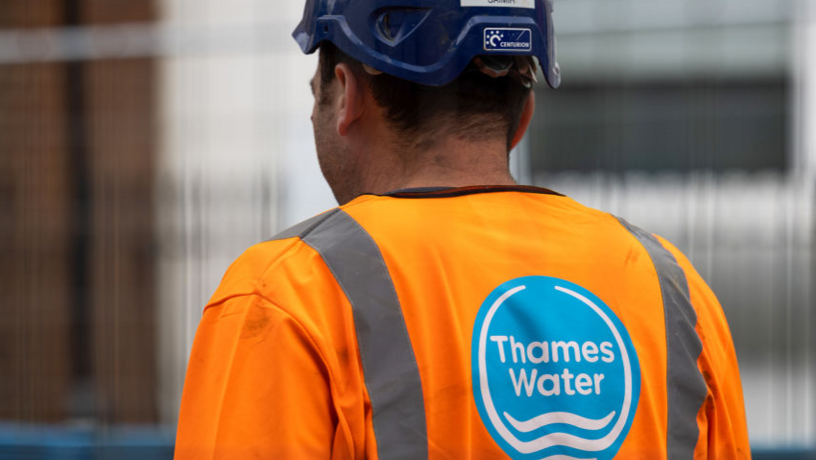Thames Water secures £3bn lifeline after court ruling

- Published
Thames Water has won a crucial High Court battle to secure a £3bn rescue loan, staving off the prospect of the debt-laden company coming under government control.
The UK's largest water and waste company was set to run out of cash by the end of March and would have likely been placed into temporary nationalisation to keep services running.
The court decision on Tuesday has given Thames breathing space to undergo a major restructuring, but the future of the company remains uncertain as it struggles with £19bn worth of debt and the ruling is set to be appealed.
Thames has faced heavy criticism over its performance in recent years following a series of sewage discharges and leaks.
The supplier serves about a quarter of the UK's population, mostly across London and parts of southern England, and employs 8,000 people.
Since the dire state of the company's finances first emerged about 18 months ago, the government has been on standby to put Thames into special administration.
Regardless of what happens to the company in the future, water supplies and waste services to households will continue as normal.
The water regulator, Ofwat, said Thames Water remained "subject to our turnaround oversight regime and safeguards are in place to ensure that services to customers are protected".
Thames has said the £3bn in emergency funding will give it the space needed to complete a restructuring of its debts and attract a cash injection from prospective new investors.
But the proposals had to be approved by the High Court after a group of Thames Water's creditors opposed it, arguing that the 9.75% interest rate on the loan was too costly.
In approving the lifeline, Mr Justice Leech ruled that the "relevant alternative" to the company's plan being approved was temporary nationalisation, known as a Special Administration Regime.
"After taking into account the public interest in ensuring the uninterrupted provision of vital public services, I nevertheless exercise my discretion to sanction the plan," he said.
He also added that Ofwat and the Environment Secretary had "not opposed the plan".
The Thames Water creditors in favour of the company's plan said the judgement was a "positive step towards efforts to deliver a highly complex operational turnaround and restructuring" and avoided "billions in additional costs on UK taxpayers".
However, the group of creditors opposed to the deal confirmed they would appeal against the court's decision, after the judge granted them permission to do so.
The group had argued an alternative "B plan" would provide the company with the same funding but on better terms and said it was "disappointed" by the ruling.
"Having this judgement reviewed by the Court of Appeal is essential against the backdrop of predatory lending to an essential utility with a clear public interest," a spokesperson said.
'Good money after bad'
Thames Water chairman Sir Adrian Montague said the ruling marked a "significant milestone" for the company while chief executive Chris Weston said it put "our business on a firmer financial footing".
However, Charlie Maynard, Liberal Democrat MP for Witney in Oxfordshire, said he would appeal against the decision.
The politician, who gave a witness statement to the High Court opposing the loan, said: "Allowing Thames Water to take on £3bn more debt is not in the interests of their millions of customers".
Henry Swithinbank, policy and advocacy manager at environmental charity Surfers Against Sewage, said the cash lifeline was a "sticking plaster that will allow Thames Water to limp along until it requires another bailout".
Thames Water's problems have been blamed on a combination of poor historical regulation, actions by shareholders, climate change and management failure.
Some have argued Thames should have been allowed to collapse and be nationalised due to it being the architect of its own misfortune. Previous owners loaded the company with debt and took out big dividends.
But others, including water companies, have argued that a growing population and the challenges of a changing climate mean bills need to be higher and were kept at lower levels for too long.
The first £1.5bn of the rescue loans to Thames Water will see the company through to the autumn.
A second instalment will be used to fund the company as it appeals a decision by Ofwat over how much Thames can raise household bills by – a process which could take up to a year.
The company was set to repay £200m worth of debt due in March, but following the court ruling, all its debt repayments have been extended by two years.
Last week, Thames launched an appeal to allow it to increase bills by more than the regulator had granted.
Ofwat has capped bill rises at 35% over the next five years, but Thames has argued they need to increase by 53%.
Five other water companies - Anglian Water, Northumbrian Water, Southern Water, and Wessex Water along with water-only company South East Water - have also said they will appeal to allow them to increase bills beyond Ofwat's cap.
In total, the six companies serve more than half of all households in England.
David Henderson, chief executive of the trade association Water UK said the extra money is need for water infrastructure investment.
Six firms have said they will not appeal: Severn Trent, United Utilities, Pennon plus Dwr Cymru Welsh Water, SES and Hafren.
Get in touch
Your Voice, Your BBC News: What story do you want BBC News to cover?